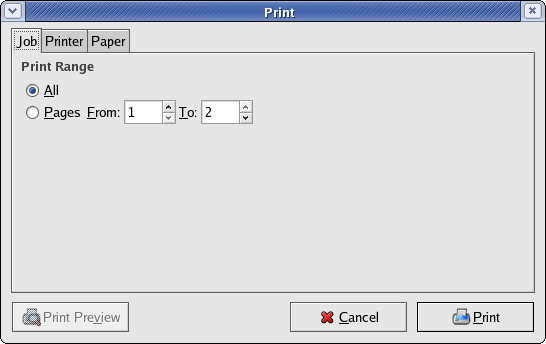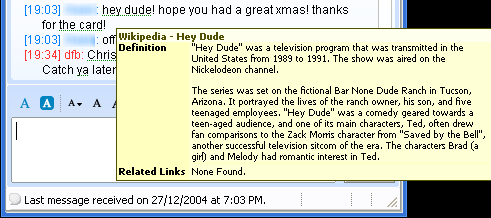Got myself a new hard disk for one of my computers, which was suffering from eternally insufficient space. The installation itself was pretty straight forward. Figure out the whole primary/secondary master/slave situation, and you’re away. Easy. Mind you, the manual did recommend moving the jumper with pliers… which broke it. Oh well, it was going in as a slave, for which I didn’t need a jumper in place.
Booted up, plonked in the Maxtor CD that came with the drive and it formatted in a jiffy, one sparkly new drive ready for business. (What, you thought this was going to be a doom and gloom blog?)
Then I pondered fiddling with the partitions on the old drive. When I had set it all up several years ago, I had decided that separate partitions were a good idea. The idea was you could have a C: for Windows and your programs, and a D: for all your data, making it much easier to backup.
That’s okay in theory, but in practice, three things can go wrong:
- Windows and applications chuck stuff you need to back-up all over the shop. There’s “Documents And Settings” (which can be moved) but some stuff also creeps into various other nooks and crannies around the file system
- Whatever space you decide to partition off may well turn out to be wrong, as your programs and/or your data grow out of all proportion.
- Thirdly, and this was the killer on this particular machine, I already had C: cordoned off for trying out Linux (and even Beos at one point, believe it or not). D: ended up for Windows. Somehow the CD grabbed E:. Data ended up on F:. Did it matter? I suppose not, but it was pretty messy.
So after installing the new drive (G: of course) I pondered re-partitioning to at least get the space from F: glomped in with C:. I won’t bother fiddling D: until Windows gets re-installed.
 Partition Magic has a reputation as being the defacto/best-of-breed partition management app. (If anybody knows of anything better, I’d be interested to hear about it. I do recall hearing about a good freeware one, but can’t remember what it was called…)
Partition Magic has a reputation as being the defacto/best-of-breed partition management app. (If anybody knows of anything better, I’d be interested to hear about it. I do recall hearing about a good freeware one, but can’t remember what it was called…)
PowerQuest, who make Partition Magic (and whom suffered through credit card fraud using my card once) got bought out by Symantec recently. You can buy and download it from Symantec AU for A$109.05. Meanwhile their US operation will charge you US$49.95 (AU$65.48) for the same thing… grrrr.
It seems to retail at places like Harris Technology for about A$90. (HT is my benchmark for retail prices, since they’re generally reasonably competitive — moreso than their Officeworks stablemate — have a good range of products, and a web site that’s easy to use.)
I happened to glance around the web and found a few other companies purporting to sell download versions of Partition Magic. The most intriguing of these was a mob called ibackups.net, who have a variety of software at what one might argue are “too good to be true” prices. A little Googling on this mob led me to their T+Cs, where hidden away down near the bottom in dot point 9.1 is this:
9.1 You understand that in order for iBackups.net to make you a copy of any software, you acknowledge that you are the legal owner of this same software, and are looking to just make a new copy for archival (backup) purposes only. You also agree to destroy all copies of the software in the event it is ever no longer voluntarily in your possession. You understand that only the licensed owner (with a valid serial number, where applicable) of the various software found on iBackups.net may use the services located here. You also acknowledge that the software you have was obtained legally and that you have the legal right to request this backup copy to be made. If you obtained your version though any other means, including any pirated versions, or if you do not already legally own the same version of the software requested, then you may not use this service.
They’re not selling software, they’re not selling a license to use software. They’re selling you a backup of software you’re already supposed to own. And indemnifying themselves if you don’t:
Furthermore, you agree to hold iBackups.net harmless for any damages that may occur for your failure to follow the U.S. Copyright and other laws as they pertain to the backup you are requesting. When you purchase any backup copy of software through iBackups.net, you agree to assume full liability in the event your actions are deemed illegal. iBackups.net does not condone software piracy and has every intention of complying with the laws pertaining to the duplication of software.
One could very well ask if they’re just selling backups, why do the prices vary so much? US$49.95 for Acrobat 5, but US$119.95 for Acrobat 6 Pro? And why do their product listings compare their price to the “retail price”, if what they’re selling is in no way comparable to the retail product?
No doubt there’s legitimate people who would be in need of such a service, but this sounds very close to the line, and they certainly give the impression they’re just selling software, not backups. They must have good lawyers.
I think I’ll keep shopping. Maybe I’ll just mosey around the city and find it the next time I’m there.
Actually, I don’t see anything on the Symantec US web site saying they won’t let me download to Australia…
Update at Noon. In fact Symantec US will happily sell to just about anywhere, judging from their web form, which includes Australia in the country dropdown. They will let you download for a year if you pay an extra US$6.99, which I chose to take, though on reflection I probably shouldn’t have… maybe worthwhile if that includes upgrades though. (Default is downloads allowed for 60 days). Oh well, US$56.94 = A$74.51 beats any AU retail price I might be able to find, even after I spend an extra 50 cents burning it to a CD.



